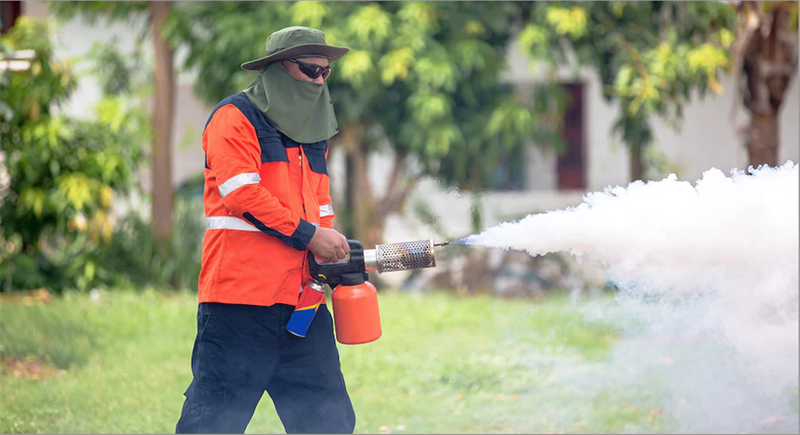FOGGING AIMS TO REDUCE THE MOSQUITO POPULATION AT SCHOOLS, AND THUS THE TRANSMISSION OF DENGUE FEVER.
 The Department of Environmental Health as part of proactive measures to keep dengue fever at bay, has embarked on the fogging of school compounds around the island, ahead of the reopening of school on Sep. 4.
The Department of Environmental Health as part of proactive measures to keep dengue fever at bay, has embarked on the fogging of school compounds around the island, ahead of the reopening of school on Sep. 4.
Recently, the Department of Environmental Health via its weekly dengue update indicated that it was intensifying its mosquito control strategies. This came on the heels of a reports out of neighbouring Martinique, where a total of 690 cases of dengue fever had been confirmed in addition to some 3,000 suspected cases.
Charletta Charles-Leon, Senior Environmental Health Officer at the Department of Environmental Health said the environmental health officers have completed their routine assessments at all schools on the island to identify active and potential breeding sites, and have also done the treatment for the larval stage of the mosquito.
“Currently we are undertaking our fogging operations which target the adult stage of the mosquito. All of this is an effort to prevent or reduce the mosquito population at school and also to reduce the risk of the transmission of dengue fever”.
Fogging involves the use of the insecticide malathion, which targets the Aedes Aegypti mosquito at the adult stage. This is stage when the mosquito has the ability to bite and transmit disease.
“I must state that fogging doesn’t kill the mosquito at the larval stage; so at that stage, when it is in the drums and the buckets and the miscellaneous containers, fogging will not kill the mosquito at this stage. This is the reason we would have sent the officers out in the field to so the assessments, to look for those active and potential breeding sites, and then do the fogging to kill the mosquito at the adult stage”.
Miss Leon said the Department of Environmental Health has also been undertaking a robust inspection of residential premises in search of active and potential mosquito breeding sites. The Department has also been engaging the various communities in an educational outreach. Households are called on to reduce the number of mosquito breeding sites and take personal responsibility for their surroundings.
"We are asking members of the public once a week, to take a walk around their homes, look for any containers that may collect water, whether it be your drums, buckets, old fridges, stoves. We are asking persons to put their bulky waste out on the bulk waste collection days - they can call St. Lucia Solid Waste Management Authority to ask them when is the bulky waste collection day for their community. If you have drums and you really need to store water, we are asking that you cover the drums tightly to ensure that no mosquito can access it. We are also imploring the tyre shops and garage owners to make a conscious effort to get rid of the tyres that are collecting water and breeding mosquitoes as well”.
The Ministry of Health, Wellness and Elderly Affairs is encouraging the public to seek medical attention if they are experiencing any symptoms of dengue fever. Symptoms of dengue fever include a sudden onset of fever, headache, joint pain or muscle pain, fatigue and rash.